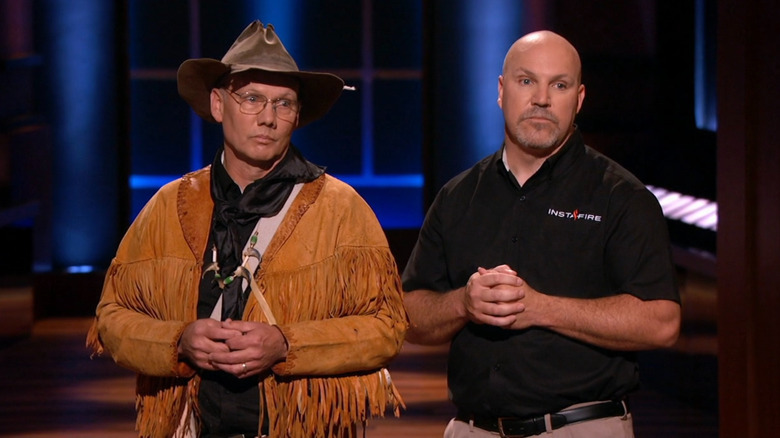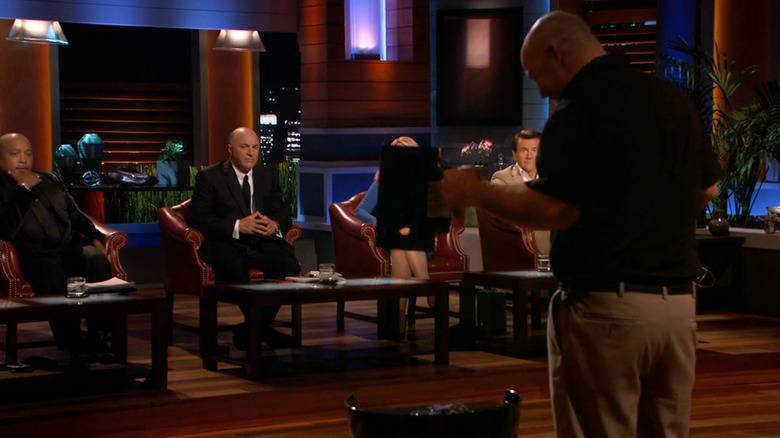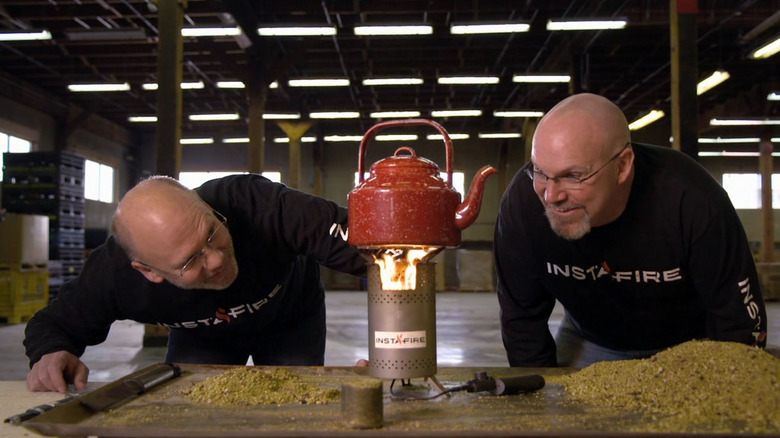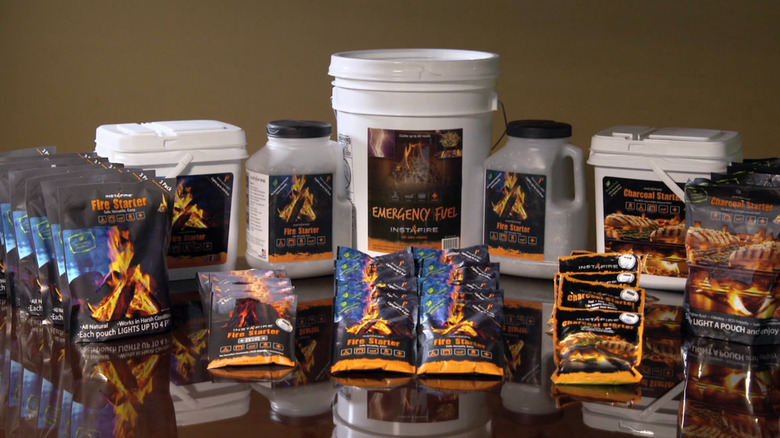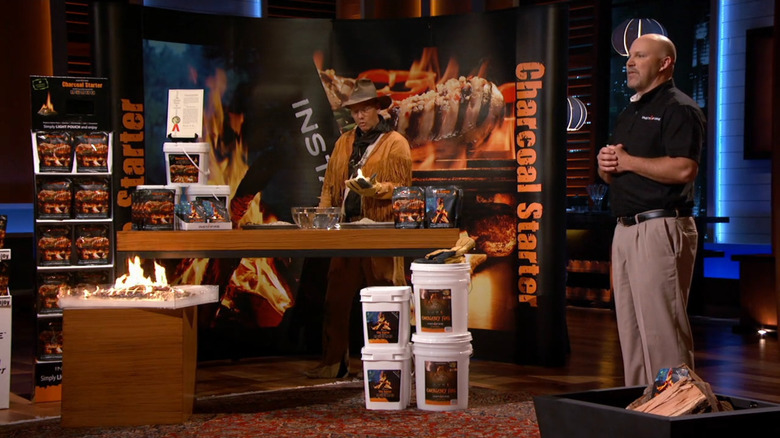Whatever Happened To InstaFire After Shark Tank?
We may receive a commission on purchases made from links.
The waters of the "Shark Tank" got heated like never before thanks to InstaFire. The company sells a line of products such as volcanic rock, wood pellets, stoves, and more that allow users to start fires with ease in any location. Its items are perfect for outdoor lovers and similarly come in handy for emergency scenarios, allowing buyers to cook and stay warm under an array of conditions.
Co-founder Konel Banner was inspired to create InstaFire after a disastrous incident experienced by his family. Following the collapse of an over 300-foot Idaho dam in the summer of 1976, members of his family went missing for a week. While they were found safe and sound, it got Banner wondering what would have happened had they not been able to secure food or warmth in time, sparking his interest in survival techniques.
According to the InstaFire website, in 2007, Banner witnessed a mountain man lighting a fire on a rock while attending a wilderness retreat. Curious as to how he made it happen, Banner and his close friend and business partner Frank Weston set forth to find a quick and easy fire starter. The duo estimates it took upwards of 100,000 tries to figure out the secret, which ultimately ended up being the cornerstone of their business InstaFire. But they only got one try to convince the sharks to invest in their company.
What happened to InstaFire on Shark Tank?
Konel Banner and Frank Weston come on "Shark Tank" looking for a $300,000 investment for 10% of InstaFire, a $3 million valuation. The entrepreneurs explain that they see their business fitting into three different markets: emergency preparedness, fire starters, and charcoal briquette lighting.
The company has been running for seven years and has sold $2.1 million worth of products. The team is projecting sales of $850,000 by year's end. Each pack of InstaFire costs a little more than $0.18 to produce, which they believe can go down to $0.13 with the implementation of a packaging machine. Each unit sells for $1.29. With an effective product and solid margins, the sharks are confused as to why InstaFire hasn't made more in its near decade-long lifespan. Banner explains that they didn't market their company well enough for much of the time and have only more recently begun getting into retail locations.
Robert Herjavec doesn't agree with the valuation and goes out. Kevin O'Leary, knowing the amount of work ahead, wants 33.3% equity. Daymond John also shows interest, willing to go in for 20% of the business and 33.3% of online sales. Mark Cuban and Lori Greiner offer to team up for a 30% stake. After some back and forth with all the investors, the duo go with Cuban and Greiner's proposal.
InstaFire after Shark Tank
InstaFire's "Shark Tank" episode aired on February 21, 2016. While the company did receive a boost in sales, it wasn't what they were expecting compared to others who experienced the "Shark Tank" effect. "On game night, we didn't sell nearly what I was kinda hoping for," co-founder Frank Weston admitted in an interview with the "Shark Tank" Podcast. "I expected anywhere between 100,000 and 250,000 orders ... Come Monday morning, I think we only had 3,000 orders out of the 100,000 we were expecting ... Monday morning I was pretty disappointed, I'll be honest with you." Thankfully, the following weeks remained steady for the company, which went on to bring in around $538,000 by the end of the quarter.
"Shark Tank" Season 8 saw InstaFire return for an update segment. Since airing, the company got its products into 7,000 retailers including Target, Walmart, and The Home Depot. The team also introduced new products such as a fuel tablet made to be used alongside their stoves for food preparedness. The segment also features investor Lori Greiner and co-founders Konel Banner and Frank Weston attending a meeting with the president of KMG International, who makes a $400,000 order to provide InstaFire's products to villages in need of electricity. InstaFire has brought in $2.4 million in revenue.
Is InstaFire still in business?
Currently, you can find InstaFire's family of flaming hot products through its official website and a slew of retailers including Amazon, Walmart, and Lowes. Buyers have largely responded positively to what InstaFire has to offer. Its fire starter packs hold a 4.4-star rating average on Amazon, with customers praising its ease of use and durability in the face of various weather conditions. One user, while noting that buyers will still need firewood to get the fire going, was surprised by just how safe InstaFire was, stating, "It could not be easier to use works great, I even felt comfortable letting my 6-year-old help me light it after I did the first one."
Lori Greiner remains loyal to InstaFire, proudly presenting the company on her website, where she makes sure to note that the company made $7.5 million within three years of appearing on "Shark Tank." InstaFire has also been featured on other prominent platforms such as Bustle and Buzzfeed.
What's next for InstaFire?
InstaFire has done well for itself since "Shark Tank." While it hasn't become one of the biggest companies to emerge from the show, it has nevertheless kept up a steady stream of success with its ever-evolving line of products. Since its time on the show. the company has greatly expanded its lineup with items such as safety matches, fuel buckets, and even a variety of stoves and ovens.
When examining the future of InstaFire, a push to further expand its product line continues to be a major priority. Investor Lori Greiner praised InstaFire's speed at getting out such a wide array of items on her website, where she wrote, "They started with 2 products and now they have 31 new products with more to come!" And while there are no specific details released as to what is coming up for InstaFire's lineup, the team is optimistic that they are on the road to "Shark Tank" superstardom. Speaking with the "Shark Tank" Podcast about their growth plans, co-founder Konel Banner proclaimed, "So there's some other products that we are looking at to develop that really have a 50 million potential, so it can be big."
